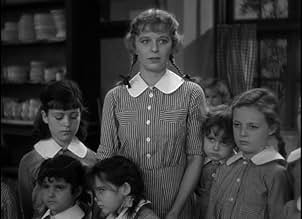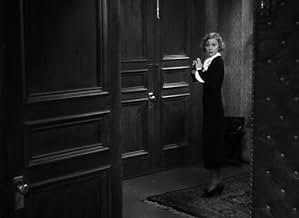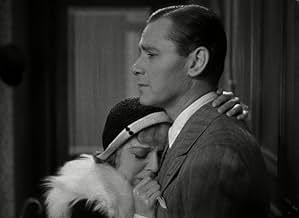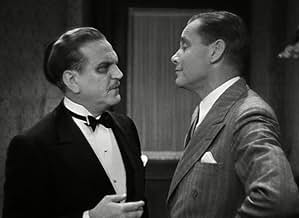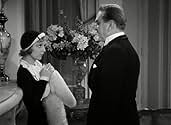A naive girl just out of a cloistered orphanage finds that being a 'good fairy' to strangers makes life awfully complicated.A naive girl just out of a cloistered orphanage finds that being a 'good fairy' to strangers makes life awfully complicated.A naive girl just out of a cloistered orphanage finds that being a 'good fairy' to strangers makes life awfully complicated.
- Director
- Writers
- Stars
- Awards
- 2 wins total
- Shoeshine Man
- (uncredited)
- Schoolgirl in Orphanage
- (uncredited)
- Director
- Writers
- All cast & crew
- Production, box office & more at IMDbPro
Featured reviews
From the outset the humour was quite subtle, and the sophisticated dialogue sounded very modern. Clearly, although this Sturges script isn't served by Sturges direction, this is still a Preston Sturges movie. And the script is backed up by sympathetic direction from William Wyler and the performances of the lead players. In particular Margaret Sullavan is fresh and funny as the fish-out-of-water naive young girl leaving her orphanage to join the outside world, determined to do a good deed every day... to be a Good Fairy to somebody.
Unfortunately the lies she feels she has to tell, and the resulting problems she's willing to face, lead her into digging a deeper and deeper hole for herself, and into dragging other characters into the hole with her. Those other characters are the Sturges eccentrics we know from his acclaimed movies of later years. The scenes with Frank Morgan and Reginald Owen shouting at each other with Sullavan between them are fabulous. Herbert Marshall is also good, but he or his character can not match the same level of lunacy.
Now I've seen this, I just hope it won't be long before I can get to see "Easy Living", the next comedy that Preston Sturges was able to write and exert the same level of influence over.
These stories can seem a tad daft or childish, especially when compared to the sophistication and raciness of the classic screwballs. The Good Fairy however makes its innocent sweetness palatable by never getting too close to reality in its setting or situations. The Eastern-European location is reminiscent of the divine "Ruritanian" style of the early Paramount musicals. Preston Sturges's dialogue is witty enough to keep a continuous background level of silliness without threatening to distract from the plot. The original story, by the way, is by Ferenc Molnar, whose most famous work is Liliom (upon which Carousel was based) and while the Good Fairy is not supernatural there are many similarities in tone.
Director William Wyler could have treated the Good Fairy as a straightforward comic ramble, but he leaves the superb cast to bring out the funny business. He instead adds depth to the love angle, shooting as if this were a serious romantic drama. One significant trick he pulls is the in the pace he gives to different parts of the film. Margaret Sullavan's dinner with Reginald Owen and the scenes at the party are very busy, with the crowds in the background constantly moving, sometimes passing in front of the principle actors. This gives a daunting atmosphere and prevents the scenes from getting in any way romantic. In contrast, Sullavan's scenes with Herbert Marshall are at a more relaxed pace, in long unbroken takes, and this brings out the warmth of their moments together.
And now onto that sublime cast, which is surely the best thing about the Good Fairy. The picture opens with Alan Hale, who gets things off to a suitably silly start. Frank Morgan and Reginald Owen have a hammy bluster about them which adds to the aforementioned bustle of those early scenes. It may seem odd to see Eric Blore out of his familiar butler territory, but it's not a problem. Blore is so naturally entertaining I would quite happily watch him playing Lady MacBeth. Pushed and pulled between these oddballs, Margaret Sullavan gives the one naturalistic performance of the whole show, and a remarkable one at that. And then there is Herbert Marshall, one of the most intrinsically likable players of the era. It's odd, because Marshall looks and sounds a lot like George Sanders, but while Sanders looks like the kind of bounder who writes relatives out of his will on an annual basis, Marshall is the sort of man you'd trust with the pin code to your life savings. And that's why he works so well here. In fact, the only bad thing about Marshall's casting is that the barber is right – he really does look better with the beard.
There are really no flaws in the Good Fairy, at least none worth dwelling on. The only reason I wouldn't call it a masterpiece is that there is nothing supremely good about it. It is emotional without being poignant, funny without being hilarious. But the Good Fairy entertains, just as a square meal fills us up, and who would ask for a gourmet dinner every night of the week?
There's not much point in synopsizing the plot; it's rather like a benign little tornado that sweeps the characters - and the viewer - up with it; there's nothing to do but surrender and see where it will touch down next, and what happens when it does. Let it suffice to say that, if you're any kind of Sturges fan, you'll find the ride delightful.
It's no surprise that winsome Sullavan, blustery Reginald Owen and the eminently reliable Alan Hale handle the material so deftly, but even normally serious players such as Herbert Marshall and Beulah Bondi exhibit understated but devastating comedy chops. Special mention must be made of Eric Blore (whose tipsy descent of a brief flight of stairs is nothing short of a miniature comic ballet) and Frank Morgan, at his flustered best, giving a performance of such sustained energy and velocity that (as my viewing companion said) he must have had to lie down for a rest after every take. An odd little sidelight: quintessentially American players Sullavan and Morgan made exactly three pictures together, in two of which they played Hungarians (this one and "Shop Around The Corner"), with the story taking place in Budapest. (In the third - "The Mortal Storm" - they played Germans in a small Alpine town.) Just one of those curious bits of trivia.
As noted in other comments, this gem of a film is apparently little known or remembered. Perhaps its release on DVD will accord it the attention and praise it so richly deserves. Do yourself a huge favor and get your hands on it right away. I saw it just a week ago and am already looking forward to watching it again.
The nice thing is there is no murders, explosions, mayhem or outright evil. All these things get in the way of DIALOG. I watch this film in awe, there is musical rhythm in the first third of the film combining dialog, action and music. You will really like all these people at the end of the film.
Time Well Spent., No Noise
Sullavan plays the improbably named Luisa Ginglebusher, a gregarious, pig-tailed orphan who regales the younger girls with her fanciful fairy tales. A blustery theater owner comes to the orphanage looking for girls to be silver-costumed usherettes at his Budapest movie palace. The head of the orphanage allows Luisa to accept the job on the condition that she performs at least one good deed a day in the real world. At the theater, Luisa meets Detlaff, a waiter who gets her an invitation to an exclusive party at which he is serving. She almost immediately has to hold off the bold advances of Konrad, a somewhat lascivious South American meat-packing millionaire who wants to seduce her and shower her with gifts. However, she isn't interested and lies about being married. When he insists on employing her "husband" so he can send him away, Luisa randomly picks a name from the phone book, hoping to do a good deed and divert some of Konrad's wealth to someone else. The lucky man is poor but proud Dr. Max Sporum, but complications obviously ensue when Luisa meets Sporum and Konrad finds out the truth.
Although she had few opportunities to play comedy, the adorable Sullavan shines in this type of shenanigan-driven farce, whether using her electric wand to point patrons to their theater seats or prancing with a multiplicity of her mirror images as she models a "foxine" stole at the department store. Reginald Owen (Scrooge in the 1938 "A Christmas Carol") gamely plays Detlaff with rubbery charm, while Frank Morgan (the Wizard in "The Wizard of Oz") is a bit too fey and downright wizardly as Konrad. Generally a tight-lipped presence on the screen, Herbert Marshall ("The Little Foxes") has never appeared more animated in a movie than he does as Sporum. Familiar character actors show up like Alan Hale as the cinema impresario, Beulah Bondi as the orphanage matron, a hilariously over-the-top Eric Blore (from all the early Fred-and-Ginger pictures) as a monocled drunk, and a menacing Cesar Romero as a pushy stage-door lothario. An unusual entry on Wyler's resume, this is quite a charmer thanks to Sullavan. The print is clear on the 2002 DVD, which includes the original theatrical trailer and a photo gallery as extras.
Did you know
- TriviaMargaret Sullavan wanted control on the set of the movie, and did spiteful things to get her way. Script girl Freda Rosenblatt said: If she was tired and wanted to go home and Willy had one more scene to do, she would smear the makeup on her face. That would mean everything had to stop so she could be made up again. Which might take hours. So they couldn't shoot. Maggie got so bored between scenes she went behind one of the sets and purposely lay down on the dusty floor. The beautiful white dress she was wearing was a wreck. That stopped everything. -- Despite all this, she and Wyler fell in love and were married during the filming.
- Quotes
Dr. Schultz: I see... and what is it you're looking for, Mr. Schlipkohl?
Schlapkohl: Schlapkohl. Usherettes! To show the customers to their seats. They wear gorgeous uniforms, I designed them myself. A big hussar's hat, a little cloak, and pants with...
Dr. Schultz: Pants?
Schlapkohl: ...with stripes. Very effective.
Dr. Schultz: I dare say. The, uh, the pants, I mean, they're not too tight?
Schlapkohl: That depends entirely on the girls, the pants are all the same size.
- ConnectionsFeatured in WatchMojo: Top 10 Comedy Movies: 1930s (2014)
- How long is The Good Fairy?Powered by Alexa
Details
Box office
- Gross worldwide
- $7,478
- Runtime
- 1h 38m(98 min)
- Color
- Aspect ratio
- 1.37 : 1

